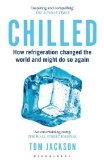Summary | Excerpt | Reading Guide | Reviews | Beyond the book | Read-Alikes | Genres & Themes | Author Bio

A History of How We Cook and Eat
by Bee WilsonTechnology in the kitchen does not just mean the Pacojets and sous-vide of the modernist kitchen. It can also mean the humbler tools of everyday cooking and eating: a wooden spoon and a skillet, chopsticks and forks.
Since prehistory, humans have braved sharp knives, fire, and grindstones to transform raw ingredients into something delicious - or at least edible. Tools shape what we eat, but they have also transformed how we consume, and how we think about, our food. Technology in the kitchen does not just mean the Pacojets and sous-vide of the modernist kitchen. It can also mean the humbler tools of everyday cooking and eating: a wooden spoon and a skillet, chopsticks and forks.
In Consider the Fork, award-winning food writer Bee Wilson provides a wonderful and witty tour of the evolution of cooking around the world, revealing the hidden history of everyday objects we often take for granted. Knives - perhaps our most important gastronomic tool - predate the discovery of fire, whereas the fork endured centuries of ridicule before gaining widespread acceptance; pots and pans have been around for millennia, while plates are a relatively recent invention. Many once-new technologies have become essential elements of any well-stocked kitchen - mortars and pestles, serrated knives, stainless steel pots, refrigerators. Others have proved only passing fancies, or were supplanted by better technologies; one would be hard pressed now to find a water-powered egg whisk, a magnet-operated spit roaster, a cider owl, or a turnspit dog. Although many tools have disappeared from the modern kitchen, they have left us with traditions, tastes, and even physical characteristics that we would never have possessed otherwise.
Blending history, science, and anthropology, Wilson reveals how our culinary tools and tricks came to be, and how their influence has shaped modern food culture. The story of how we have tamed fire and ice and wielded whisks, spoons, and graters, all for the sake of putting food in our mouths, Consider the Fork is truly a book to savor.
It is not just foodies who will love
Consider the Fork
, which is a fun and breezy read. At the very least, it will make you look at your pots and pans in a new light. And maybe even tempt you to give that bright-red Cuisinart on your countertop a whirl to create yet another memorable meal...continued
Full Review
 (853 words)
(853 words)
(Reviewed by Poornima Apte).
While Consider the Fork is filled with delicious nuggets about the history of kitchen implements, some geeky gourmands are looking back to the future and revolutionizing the idea of exactly what we consider a kitchen tool.
 Molecular gastronomy, the precision cooking that uses emulsification, gellification and other techniques to create tasty and stunningly beautiful dishes, is cutting-edge and is now beginning to take off among cooks who want to create tasty dishes that also have an entertainment factor. Imagine making chocolate spaghetti, mint caviar or balsamic vinegar pearls. Trendy restaurants now create "foam" made of beets or mushrooms and use them as art on created dishes.
Molecular gastronomy, the precision cooking that uses emulsification, gellification and other techniques to create tasty and stunningly beautiful dishes, is cutting-edge and is now beginning to take off among cooks who want to create tasty dishes that also have an entertainment factor. Imagine making chocolate spaghetti, mint caviar or balsamic vinegar pearls. Trendy restaurants now create "foam" made of beets or mushrooms and use them as art on created dishes.  A kitchen tool to make these, Molecule-R, is already ...
A kitchen tool to make these, Molecule-R, is already ...

If you liked Consider the Fork, try these:

by Tom Jackson
Published 2016
The refrigerator may seem mundane nowadays, but it is one of the wonders of twentieth-century science - lifesaver, food preserver, social liberator.

by Judith Flanders
Published 2016
The 500-year story of how, and why, our homes have come to be what they are, from the critically acclaimed New York Times bestselling author of The Invention of Murder and The Victorian City